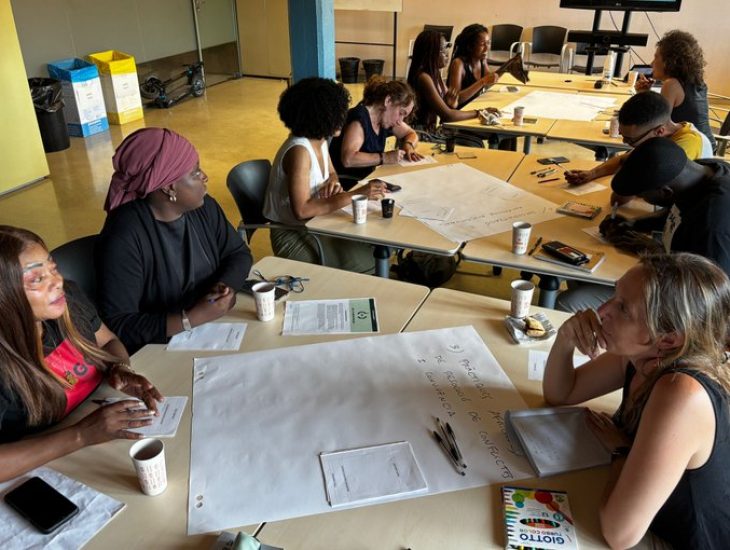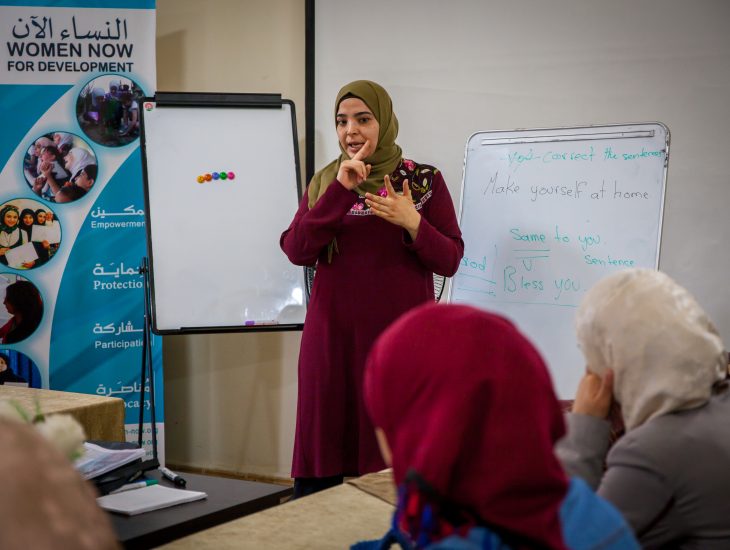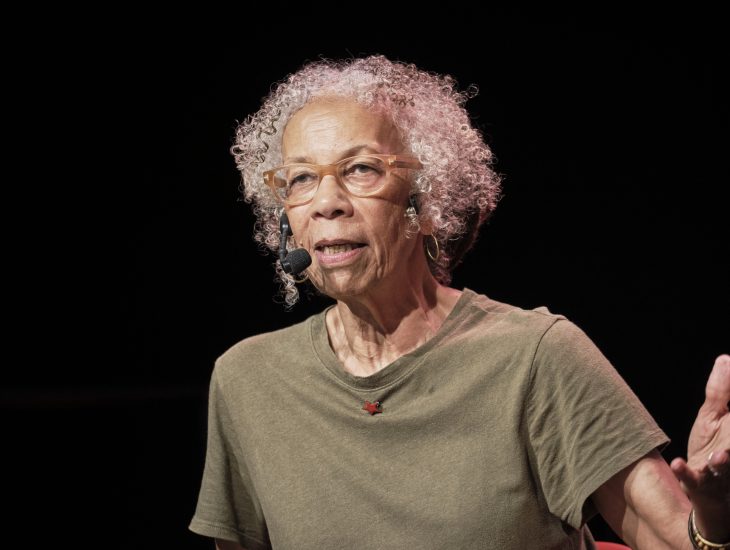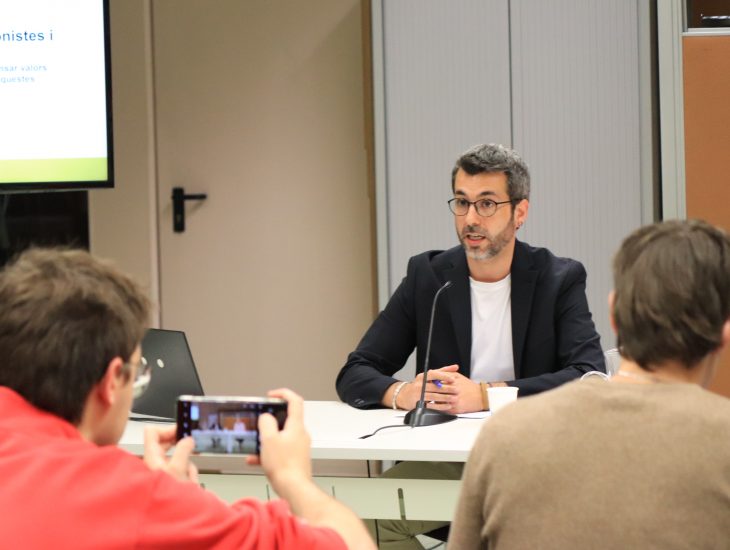The assessment of coexistence in Catalonia as a whole, and at a municipality/neighborhood level, continues to score over 6 out of 10. But the perception that there are quite a few or many problems in the immediate environment, especially related to antisocial behavior, has increased considerably. These are the findings of the ICIP 2022 “Coexistence and cohesion in Catalonia” Survey, which also reflects a society that is committed to human rights and dialogue, that rejects the use of violence to defend the country or ideas, and that regards multiculturalism favorably.
In the context of the war in Ukraine, the survey – conducted in October 2022 – also indicates that Catalan society is open to the resettlement of refugees and critical of increasing military spending.
This is the fourth survey published by ICIP on perceptions and attitudes regarding coexistence in Catalonia and the third to include a focus on ideological and emotional polarization. This means that the current survey includes comparative data from the last four years. In this sense, the ICIP 2022 Survey has found that political conflict in Catalonia continues to be the issue that most polarizes citizens, followed by language, which moves up from fifth to second place.
“The survey is directly related to two major issues currently on the political agenda: on the one hand, despite the reduction of tension regarding the pro-independence debate, polarization remains. On the other hand, citizens have a different perception of security than NATO and the Spanish government, since they consider increased military spending as a major security risk,” says ICIP director Kristian Herbolzheimer.
Coexistence and social trust
Citizens rated the perception of coexistence in Catalonia with a score of 6.3 out of 10 and 6.6 at the municipality/neighborhood level. This score remains stable compared to the ICIP 2021 Survey, with a variation of one tenth, and slightly lower than the 2020 and 2018 surveys, when it was around or even over 7 out of 10.
Antisocial behavior is perceived, by far, as the main problem of coexistence at the local level. Up to 74% of the people surveyed reported many or quite a few problems of antisocial behavior at the municipality/neighborhood level, a rate that has increased considerably compared to four years ago, when it was 46%. Compared to antisocial behavior, the poor integration of migrants (47%), crime (45%) and a lack of public safety (44%) scored far lower. The perception that there are many or quite a few problems of coexistence is higher in large cities of over 100,000 people.
As for trust indicators, the survey shows that citizens tend to trust other people, with an average score of 5.2 out of 10. While this is above the European average, the percentage of people who are very distrustful of others has increased to 21.5%, double the rate of 2020.
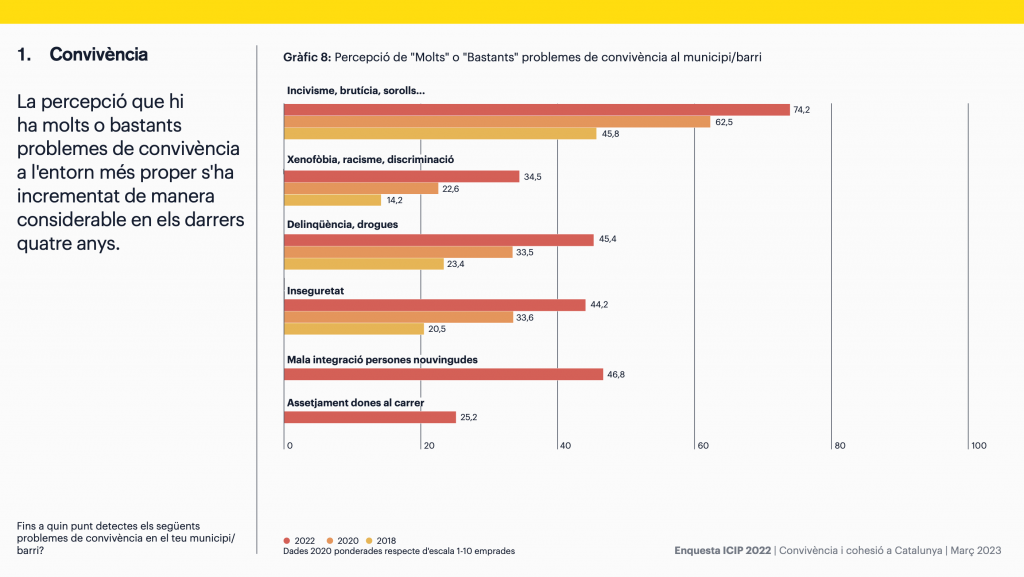
Cohesion
On this occasion, the ICIP Survey has focused on the degree of cohesion of Catalan society based on different indicators: an assessment of immigration, acceptance of different groups at risk of vulnerability and respect for human rights.
In relation to immigration, a majority (64%) considers that living with people from different backgrounds enriches society. However, 24% somewhat or strongly believe that Catalonia has become a worse place to live because of immigration, 28% believe that it is better for the country if everyone shares culture and traditions, and a third of the people surveyed perceive that their culture or way of life is under threat.
In terms of acceptance of different groups, Catalonia is among the leading countries in Europe in terms of tolerance towards refugees, homosexuals and bisexuals and, to a lesser degree, transsexuals. However, 20% say they do not feel comfortable with transsexual people.
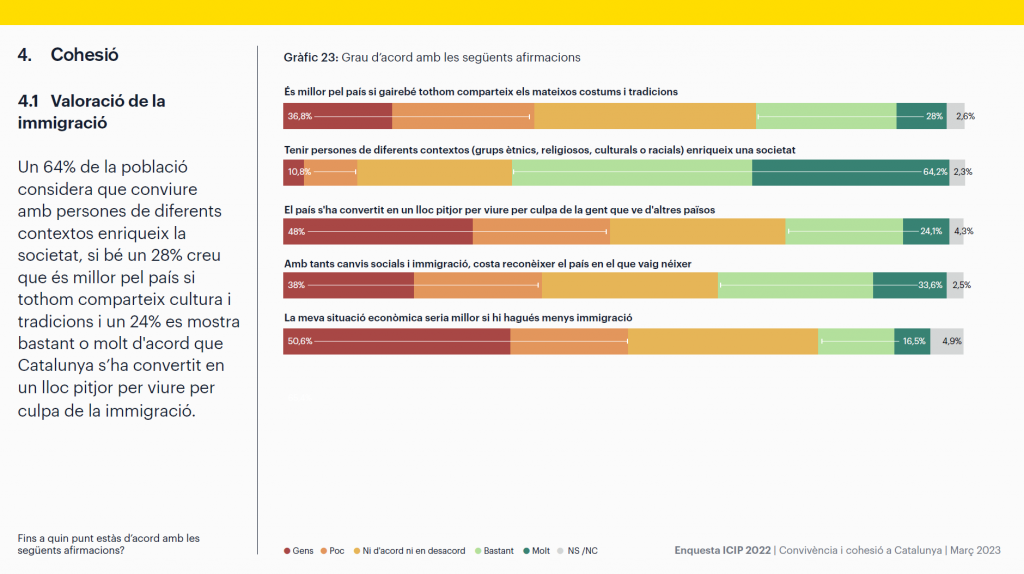
Finally, almost 90% of the people surveyed consider that human rights are important to create a just society and that institutions must strive to guarantee them. When asked about the situation in Catalonia, 43% of the people surveyed believe that human rights are violated, while 21% consider that there are no human rights violations.
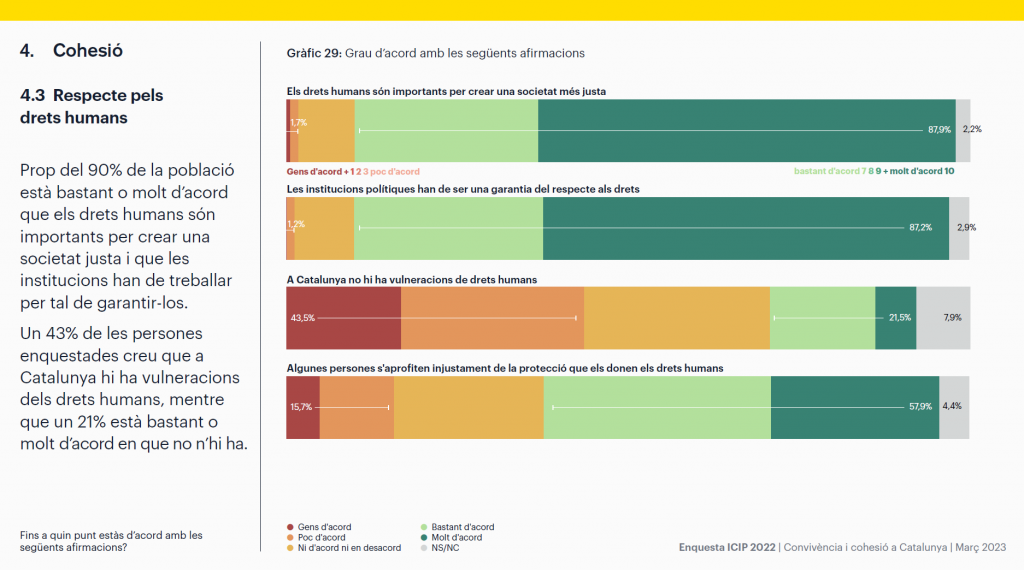
ideological and emotional polarization
The ICIP 2022 Survey also analyzes the perception of polarization in Catalan society, an indicator that remains at the same level as in previous surveys. The perception that political parties and the media are more polarized than society as a whole remains the same. Regarding the analyzed topics of debate, the pro-independence movement continues to be the issue that most polarizes Catalan citizens and polarization has increased in relation to language, which moves up from fifth place to second place compared to the 2020 data.
If we look at emotional polarization, namely, at the feelings that people perceive towards those who think differently, respect predominates over all other emotions, followed by helplessness, with rates that remain stable. Sadness and fear of people who think differently have increased somewhat and confidence has decreased.
The survey also reveals a favorable attitude towards dialogue with people who think differently: 68% of the people surveyed agree or strongly agree that an effort should be made to talk to everyone regardless of their ideas.
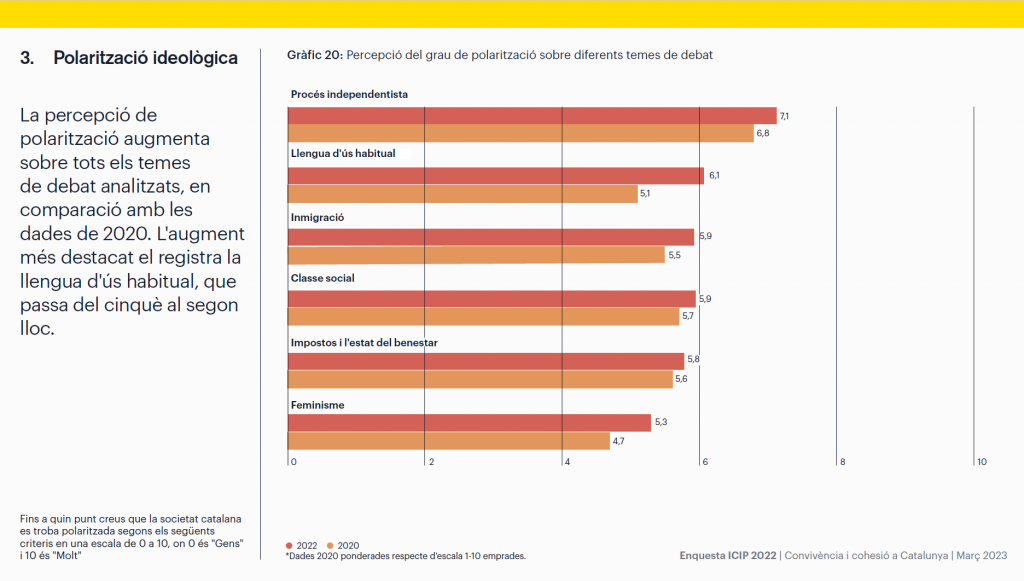
Percepció de riscos i amenaces
The survey also portrays a society that is aware of the values of social and global justice. A society that perceives as risks, in this order: economic crises, the deterioration of democracy, climate change, disinformation, the increase in inequality and the rise of the extreme right. In the case of the extreme right, almost 40% of the population considers it to be a maximum risk.
In the context of the war in Ukraine, people identify Russia’s world influence and increases in military spending as risks to their own security. Half of the population believes that military budget increases pose a high or very high risk to their security, and 62% of the population believes that the Spanish government spends too much money on defense.
As a current situation analysis regarding the Russian invasion of Ukraine, the sample includes public perception on the resettlement of refugees. There is a favorable attitude towards taking in and assisting people from Ukraine and Syria. This predisposition is greater in the case of Ukrainians – 18% of the population considers that the presence in Catalonia of people from Syria increases the risk of terrorism.
Finally, the sample devotes a chapter to evaluate the predisposition of citizens to use violence. This predisposition is slight in the cases of defending one’s country or ideas (15%) or the environment (16%). However, it is greater in the case of defending the family (64%).
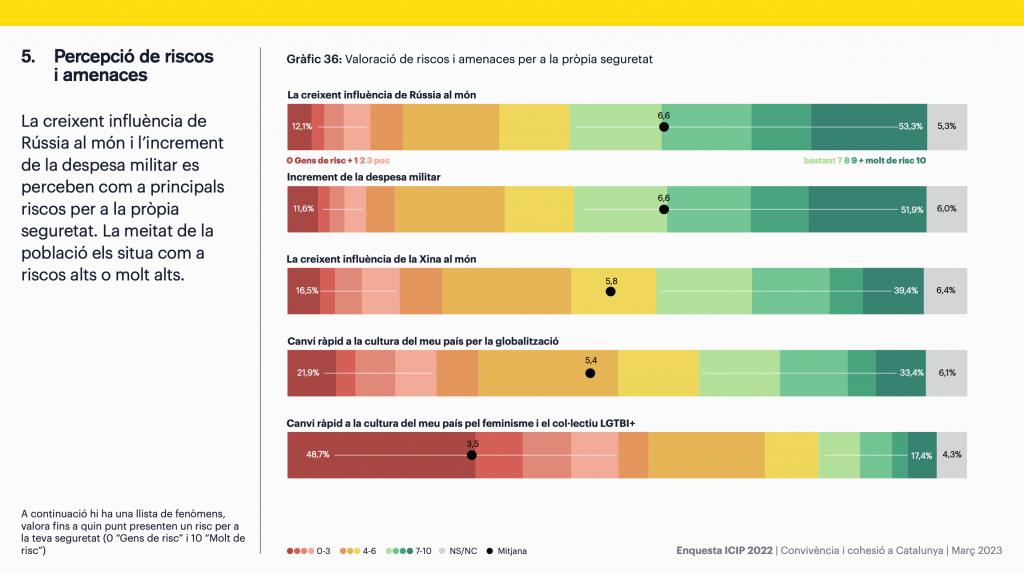
Methodology used
The ICIP 2022 Survey was carried out between 17-24 October 2022. It was based on 2,047 online interviews with people over 18 years of age living in Catalonia, with a margin of error of 2.17%. It is a sample with cross-quotas of gender, age (in age groups of ten years) and provinces (Barcelona, Girona, Lleida and Tarragona).
This is the fourth survey published by ICIP on the perception of coexistence in Catalonia and the third that evaluates the degree of polarization. Previously, ICIP has published the surveys “Polarization and coexistence in Spain 2021: The role of the territories” (ICIP and EsadeEcPol), “Coexistence and polarization in Catalonia. ICIP 2020 Survey” and “Public perception of coexistence and security in Catalonia. ICIP 2018 Survey.”

